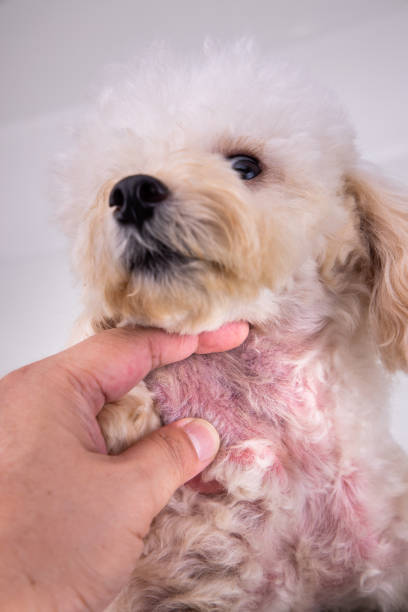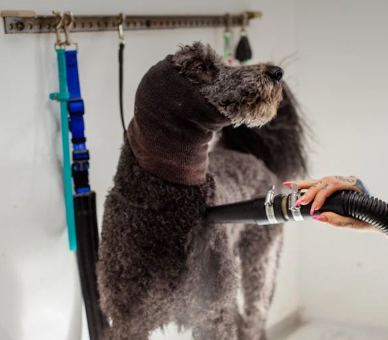Dealing with Common Poodle Skin Conditions
Poodles are renowned for their luxurious coats, but like all breeds, they can be prone to various skin conditions that may cause discomfort and irritation. From allergies to dermatitis, addressing these issues promptly is crucial for maintaining your poodle’s skin health and overall well-being. In this article, we’ll explore common poodle skin conditions and effective strategies for dealing with them to keep your furry friend comfortable and happy.
Toby and Ace is creating a world where every dog, regardless of breed, appearance, age or ability finds comfort in their owners. We provide comfort by creating products that are not only functional for your dog, but practical for your everyday life. Because nothing brings more comfort to our day-to-day lives than the presence of our pets, it’s only fair that we do the same for them. Visit here
- Allergic Dermatitis
Allergic dermatitis is one of the most common skin conditions affecting poodles, with triggers including environmental allergens (pollen, dust mites), food allergies, and flea bites. Symptoms may include itching, redness, hair loss, and skin infections. To manage allergic dermatitis, identify and eliminate potential allergens from your poodle’s environment, such as switching to hypoallergenic bedding, using fragrance-free detergents, and avoiding known food allergens. Consult with your veterinarian to determine the best treatment approach, which may include antihistamines, medicated shampoos, or allergy testing.
- Atopic Dermatitis
Atopic dermatitis is a chronic inflammatory skin condition which comes with itching, redness, and recurrent skin infections. It is often triggered by environmental allergens such as pollen, mold, and dust mites. To manage atopic dermatitis in poodles, minimize exposure to allergens through regular bathing with hypoallergenic shampoos, keeping indoor environments clean and free of dust and mold, and using air purifiers. Your veterinarian may prescribe medications such as corticosteroids, antihistamines, or immunotherapy to alleviate symptoms and manage flare-ups.
- Seborrhea
Seborrhea is a skin condition characterized by excessive oil production and flaky, scaly skin. Poodles may develop either oily (seborrhea oleosa) or dry (seborrhea sicca) forms of seborrhea, both of which can cause discomfort and skin irritation. Treatment for seborrhea in poodles typically involves regular bathing with medicated shampoos containing ingredients such as sulfur, salicylic acid, or coal tar to help control oil production and remove scales. Your veterinarian may also recommend dietary supplements such as omega-3 fatty acids to support skin health.
Toby and Ace is creating a world where every dog, regardless of breed, appearance, age or ability finds comfort in their owners. We provide comfort by creating products that are not only functional for your dog, but practical for your everyday life. Because nothing brings more comfort to our day-to-day lives than the presence of our pets, it’s only fair that we do the same for them. Visit here
- Hot Spots (Acute Moist Dermatitis)
Hot spots, also known as acute moist dermatitis, are red, inflamed patches of skin that often appear suddenly and can spread rapidly if left untreated. They are typically due to underlying factors such as allergies, flea infestations, or moisture trapped in the coat. To treat hot spots in poodles, clip the hair around the affected area to allow air circulation and apply a topical antiseptic solution recommended by your veterinarian to clean and disinfect the skin. Your veterinarian may also prescribe oral antibiotics or corticosteroids to reduce inflammation and prevent secondary infections.
- Parasitic Infestations
Poodles are susceptible to parasitic infestations such as fleas, ticks, and mites, which can cause skin irritation, itching, and discomfort. Preventive measures such as regular flea and tick control treatments, grooming, and environmental management can help minimize the risk of parasitic infestations in poodles. If your poodle does develop a parasitic infestation, consult with your veterinarian for appropriate treatment options, which may include topical or oral medications to eliminate the parasites and relieve symptoms.
Toby and Ace is creating a world where every dog, regardless of breed, appearance, age or ability finds comfort in their owners. We provide comfort by creating products that are not only functional for your dog, but practical for your everyday life. Because nothing brings more comfort to our day-to-day lives than the presence of our pets, it’s only fair that we do the same for them. Visit here
Conclusion
Dealing with common skin conditions in poodles requires a proactive approach that includes identifying triggers, managing symptoms, and seeking veterinary guidance when necessary. By understanding the causes and symptoms of common skin conditions such as allergic dermatitis, atopic dermatitis, seborrhea, hot spots, and parasitic infestations, you can take steps to keep your poodle’s skin healthy and comfortable. With proper care and attention, you can help your poodle enjoy a happy, itch-free life.
Important Affiliate Disclosure
We at doglinked.com are esteemed to be a major affiliate for some of these products. Therefore, if you click any of these product links to buy a subscription, we earn a commission. However, you do not pay a higher amount for this. Rest easy as the information provided here is accurate and dependable.







